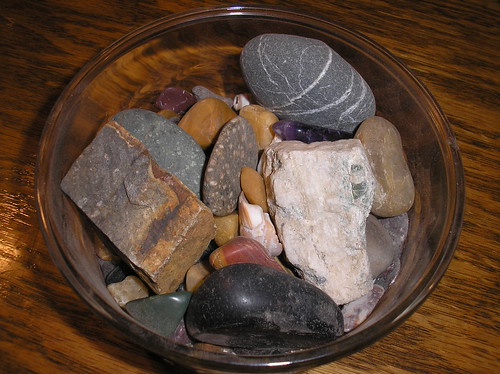“It’s a good thing to learn more about nature in order to share this knowledge with children; it’s even better if the adult and child learn about nature together. And it’s a lot more fun.” Last Child in the Woods, Richard LouvNow may be a great time to start a collection of items for nature study. This can be an organized collection or various items collected to display on a seasonal table.
Easy collection of rocks in a bowl.
If your nature study is going along well and you are enjoying the rhythm of your time together, don’t add anything new. The collections are something that can happen at any point in your study of nature. I would rather see you spending more time outdoors if the collections take away from your energy to keep that outdoor time up. On the other hand, if your children are already bringing items home and they want a way to display them, give the collection a try.
1. Nature study is something that builds from week to week and this week’s assignment includes elements of the first five assignments . In your focus area, pick another item from your list to read about with your child from the Handbook of Nature Study. After reading about the item to the child, take a few minutes to read the observation suggestions to yourself. Keep these ideas in mind as you head out for your 10-15 minutes of nature time outdoors.
“Out-of-door life takes a child afield and keeps him in the open air, which not only helps him physically and occupies his mind with sane subjects, but keeps him out of mischief. It is not only during childhood that this is true, for love of nature counts much for sanity in later life.” Handbook of Nature Study, page 2
2. After your outdoor time, take time to discuss the outing with your child, helping them to find words to describe their experience. Add anything new to your list of items observed in your focus area that you are keeping in your nature journal. Make note of any additional research that needs to be done for things your child is interested in.
“ In nature study any teacher can with honor say, “I do not know”; for perhaps the question asked is as yet unanswered by the great scientists.” page 33. Give an opportunity for a nature journal entry. Remember this can be a simple drawing, a label, and a date. Challenges 2 and 3 have ideas for alternatives to drawing in the nature journal.
4. Think about starting a collection to supplement your nature journal in your focus area.
Some ideas for collections: leaf rubbings, tree bark rubbings, pressed flowers, rocks, feathers, shells, seeds, insects, or photographs or drawings of subjects that are too large to collect like trees and clouds.
Some ideas for storage:
- Egg cartons work well for things like rocks or seeds.
- Sheet protectors work well for holding items like feathers, leaves, or photographs.
- Specialty boxes you purchase for insects, rocks, shells, or butterflies.
- Wicker paper plate holder to keep each season’s items on your science shelf. (See photo in blog entry.) It works well for things like small cones, leaves, twigs, moss, or seed pods.
- Shoe boxes work well if you make little compartments with cardboard or cardstock to section off the items.
- Tic-tac boxes for sand, small rocks, or transporting insects.

5. Post an entry on your blog listing out what you did for your Outdoor Hour. You can link up by clicking the carnival button or you can send them directly to me: harmonyfinearts@yahoo.com.
You can purchase all of the first ten challenges in a convenient ebook along with custom notebook pages.



No comments:
Post a Comment